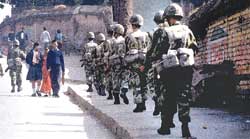 For the first time since its inception, the National Security Council held its regular session outside Singha Darbar recently. Prime Minister Surya Bahadur Thapa drove across the Tukucha to the Royal Nepali Army HQ for the meeting. Soon after, the government approved the military's proposal to increase its strength by 3,500 this year. The army proposes to be 100,000-strong fighting force within a decade, double its 1990 troop strength. In the two years since the army joined the war against the Maoists, it has augmented its strength by 15,00 soldiers. The cost to the exchequer: Rs 7.18 billion so far this year, with an additional demand of nearly Rs 2 billion pending at the Finance Ministry.
For the first time since its inception, the National Security Council held its regular session outside Singha Darbar recently. Prime Minister Surya Bahadur Thapa drove across the Tukucha to the Royal Nepali Army HQ for the meeting. Soon after, the government approved the military's proposal to increase its strength by 3,500 this year. The army proposes to be 100,000-strong fighting force within a decade, double its 1990 troop strength. In the two years since the army joined the war against the Maoists, it has augmented its strength by 15,00 soldiers. The cost to the exchequer: Rs 7.18 billion so far this year, with an additional demand of nearly Rs 2 billion pending at the Finance Ministry. Government ministers are now exhorting the public to take up arms against the insurgents. Addressing a gathering in Kapilbastu, not far from the birthplace of the Buddha, government spokesman Kamal Thapa declared this week that the state was ready to "arm, train and cover" civilians ready to take on the Maobadi. We know the kind of people who get involved in such things, so we won't go into details. But we need to be prepared for the rise of vigilantism.
The government is also pushing the concept of a 'unified command' as a matter of urgency. It would put the entire government machinery at the disposal of the security apparatus, giving the government literally the power of 'the coercive force of the state'.
Theoretically, CDOs are responsible for law and order in their districts. In practice, however, they don't take any decision without the clearance of the defence forces. Since no representative institution is functioning, the press has been persuaded to cooperate, and as the political parties are cowed down, there is nobody to question the functioning of the state at the local level. Fear of the insurgents keeps the intelligentsia in thrall of the dominant force.
When he denounced militarisation recently, Girija Prasad Koirala was being considerate towards the compulsions of the Thapa cabinet. But the process of militarisation in fact, began during Koirala's stewardship, to continue and grow when Sher Bahadur Deuba freed the military from parliamentary control. In the past year, militarisation has gathered pace.
Australian political scientist Richard Tanter says militarisation of society follows predictable patterns:
. First, the military establishes itself in the 'political space immediately beneath the executive power'.
(In Nepal, the setting up of a permanent secretariat of the National Defence Council, a constitutional body envisioned to be temporary by its very nature, can be adjudged to be such a move.)
. Second, the military needs a presence in the economic life of society to prove its utility.
(The army's plan to establish a bank didn't work out, but it is hired to protect telephone towers and electric facilities. The NEA and NTC use the exhorbitant fees they charge customers to pay the army to guard its facilities against Maoist attacks.)
. Third, the traditional values and norms of society are bent toward military values and norms.
(Nepal was unified by the khukuri of conquest by a martial race. The military mindset is deeply ingrained in the Nepali psyche, and it is valour in the battlefield rather than entrepreneurship or public service that is valued by society.)
. Fourth, violation of human rights becomes common.
(The insurgency has dragged our sad human rights record even lower. There is now even less respect of life, liberty and dignity of fellow citizens.)
. Fifth, Tanter says, counterinsurgency operations are initiated and/or expanded by the state to rationalise the process of militarisation.
(Need we say more?)
. Sixth, international aggression is unleashed against perceivable enemies of the state.
(In our context, the Americans seems to be only too willing to fulfil that role.)
. Lastly, Tanter says, the defence forces begin to appropriate larger share of the budget.
(Finance Minister Prakash Chandra Lohani is too suave to show the pressure he is under, but bureaucrats in Bagh Durbar openly admit that it is becoming difficult to meet the growing demands of the Ministry of Defence.)
There is no doubt that the Maoists are primarily responsible for beginning the process of militarisation of Nepali society. But once this insurgency comes to an end, which we hope will be sooner rather than later, the culture of guns will pose a bigger problem than either the military or the Maoists can contemplate. Talleyrand was the foreign minister of Napoleon. He once told his emperor, "You can do everything with bayonets, sire, except sit on them."



